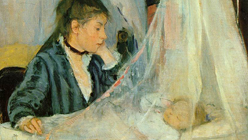Motherhood is a recurring motif throughout art history, from Michelangelo’s mournful figure of Mary in Pietà (1498-1499) to Berthe Morisot’s portrait of her sister anxiously eyeing a sleeping newborn in The Cradle (1872). Much of art history presents motherhood as fully consuming. The central maternal figures of early painting and sculpture are not presented — nor are they perceived — as multi-faceted women with hopes and ambitions that run parallel with, or perhaps complicate, motherhood. The 20th century rise of feminism presented a shift in visual culture wherein artists began to contend with the social expectations of women and the complexities of motherhood. It is largely within recent contemporary art that we see artists address the unique challenges of working motherhood. This is often evidenced in the work itself, such as with Mierle Laderman Ukeles’ 1969 declaration of herself as a “maintenance artist” in the development of works that engaged both domestic life and sanitation work. Another work on par with this, Mary Kelly’s Post-Partum Document (1973 – 1979) was an early conceptual work that explored the mother-child relationship. The first iteration of Kelly’s work shown at the London Institute of Contemporary Arts featured soiled diapers among other documentation, causing a public uproar.

Mary Kelly, Post-Partum Document, 1973 – 1979
In October 2011, Mierle Laderman Ukeles gave a moving talk-cum-performance about her work at the Creative Time Summit in New York, archived in a video now available on YouTube. During this performance, the artist delivers a manifesto written in the early ’70s that discusses the merger of her life as a wife and a mother with her work as an artist. “Here is my manifesto,” she recites, “written as a young artist, age thirty, who decided to survive even though she became a mother-maintenance worker and fell out of the picture of her autonomous, avant-garde Western heroes. I had an epiphany: If I am the boss of my freedom, then I name maintenance art. It is art and art history that must change.”
Mierle Laderman Ukeles, Creative Time Summit 2011, New York



